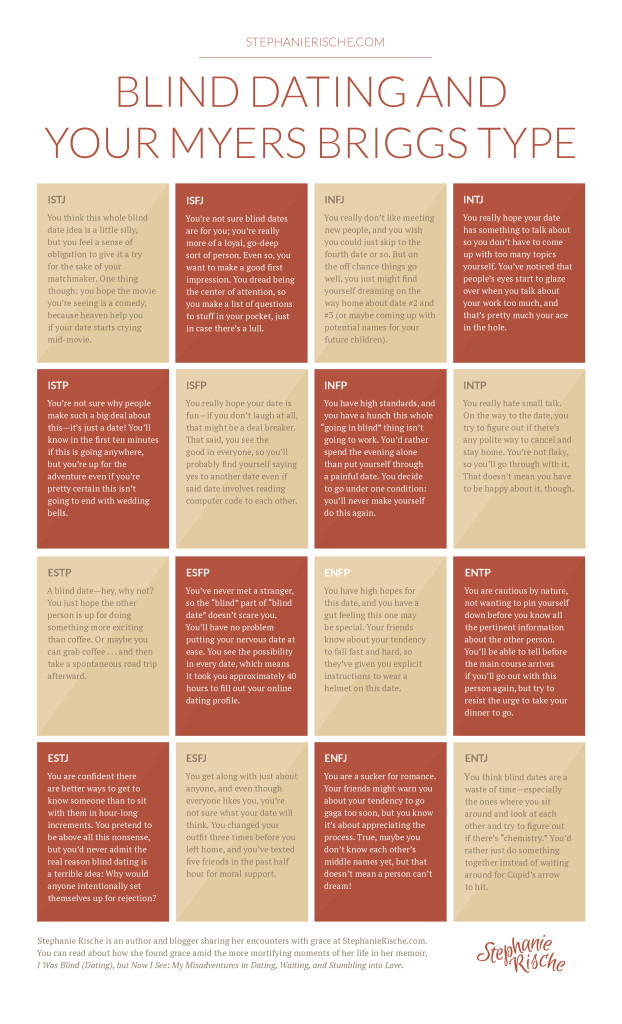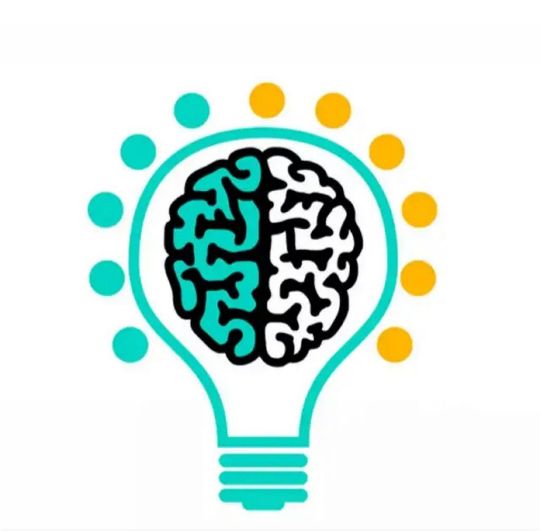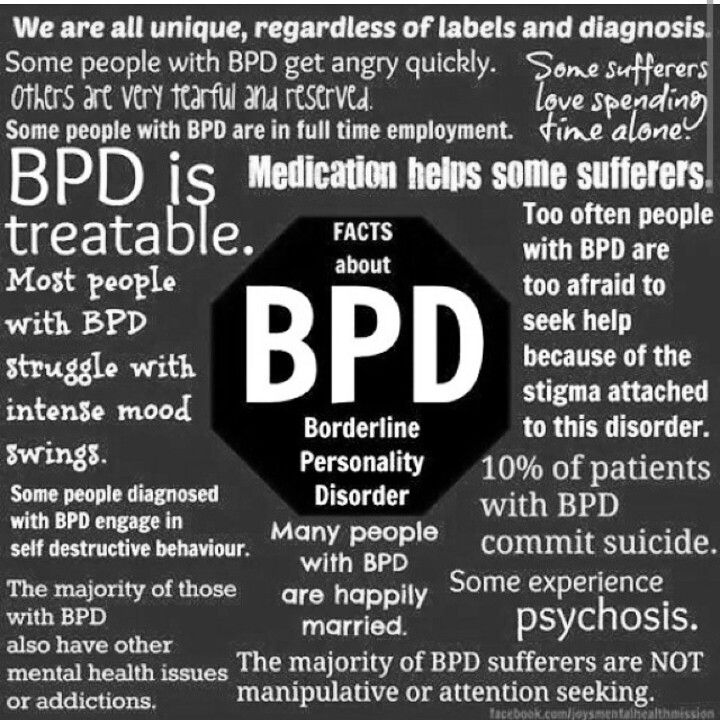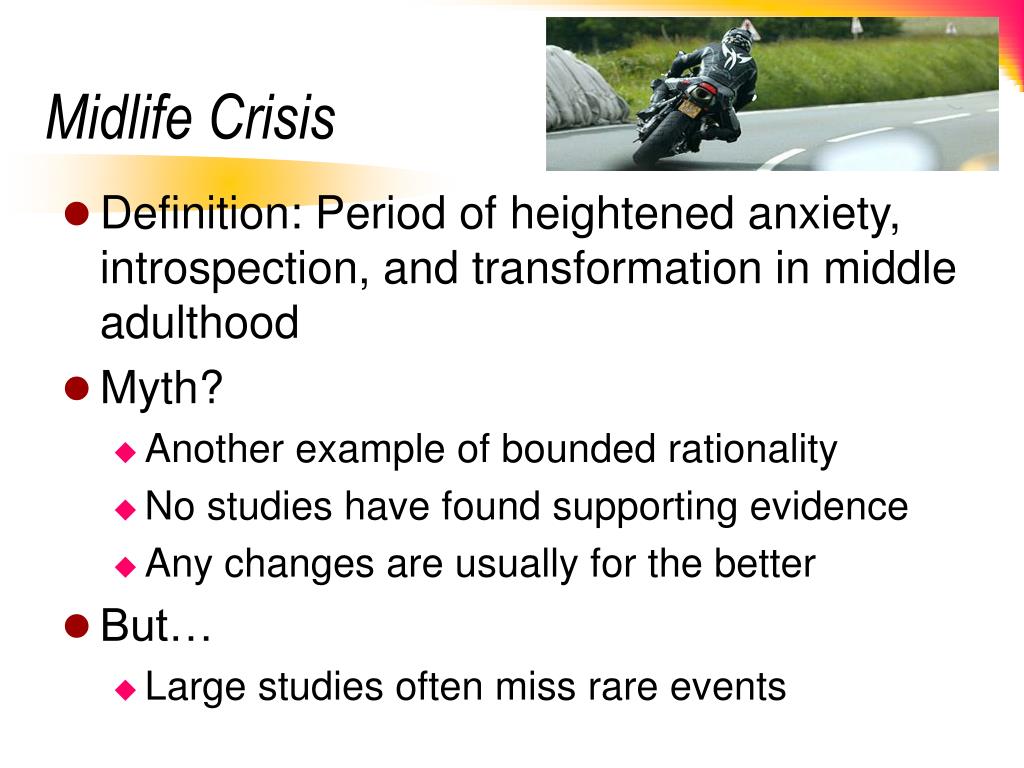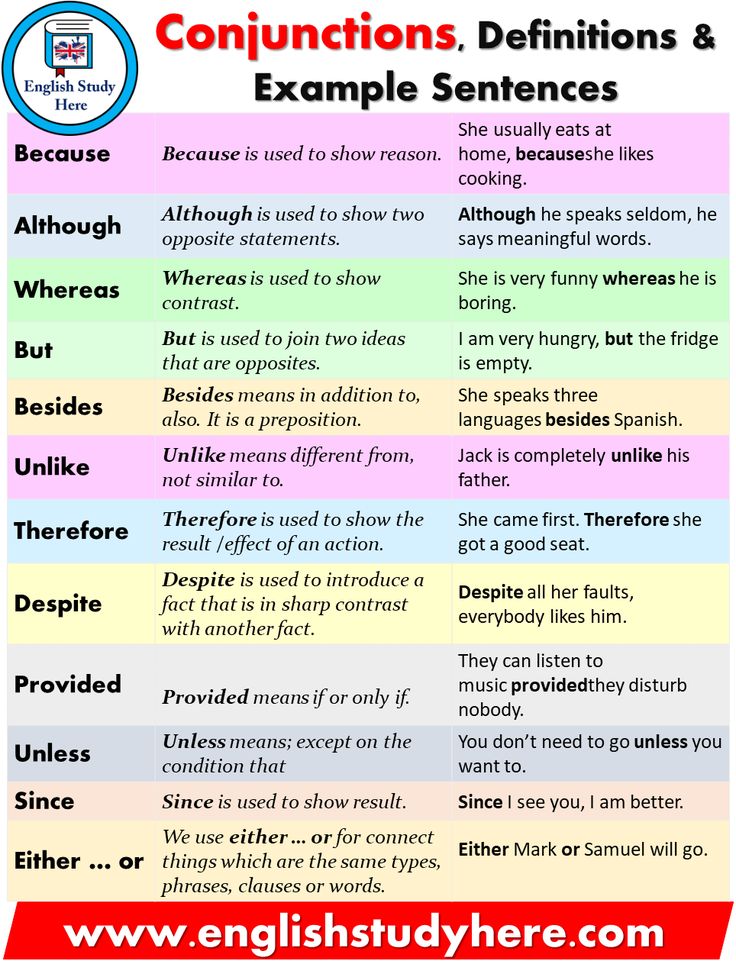What are the most common myers briggs personality types
What is the Most Common Personality Type?
Do you ever meet someone and feel like you already know them? While there are 16 possible personality types in the Myers and Briggs system, some are more common than others.
The most common personality types appear time and again in the general population, so you can start to notice similarities between the way people think, socialize and structure their lives.
Here’s everything you need to know about the most common personality types and their shared traits.
Overall, the most common personality type is ISFJ
The most common personality type is the ISFJ personality type, known as ‘The Protector’. This type occurs in 14% of the population. It is also the most common personality type among women.
ISFJ stands for Introversion, Sensing, Feeling and Judging. This combination of traits means that people with the ISFJ personality type tend to be compassionate, caring and conventional. They are known for being well-grounded and committed to upholding the traditions and norms of society.
ISFJs also tend to be hardworking with a profound sense of social responsibility. This makes them reliable, dependable and loyal.
There are competitors for the most common personality type
While ISFJ is the most common personality type among the general population, the picture is a little more complicated than it first seems.
That’s because personality types are not evenly distributed through populations. We see variations by culture, geography, and gender.
The most common personality type for women
As we have seen, the most common personality type for women is ISFJ. The ISFJ personality type accounts for 19% of women - that’s almost one fifth of all women!
Perhaps unsurprisingly, the ISFJ personality type tops the list when it comes to representation in education, healthcare and religious occupations. These professions tend to be heavily female, and people with the ISFJ personality type (of any gender) tend to place health, spirituality and a happy family as the things they value most.
The most common personality type for men
For men, however, the most common personality type is ISTJ. As many as 16% of men qualify as an ISTJ personality type. This is interesting as among the general population, ISTJ is only the third most common personality type, representing approximately 12% of people.
ISTJs are very close cousins of ISFJs. They, too, tend to be responsible and dependable. ISTJs are characterized by a desire to create order within organizations and institutions. They are adept at planning and have good attention-to-detail, preferring to follow a clear procedure. People with the ISTJ personality type tend to have a strong desire to maintain social order and can be resistant to change.
All this perseverance and planning means that both ISTJs and ISFJs tend to be the people who work very hard behind the scenes to make things run smoothly for everyone else. The main difference between them is that ISTJs are more logic-oriented whereas ISFJs are generally warmer and more tactful with people’s feelings.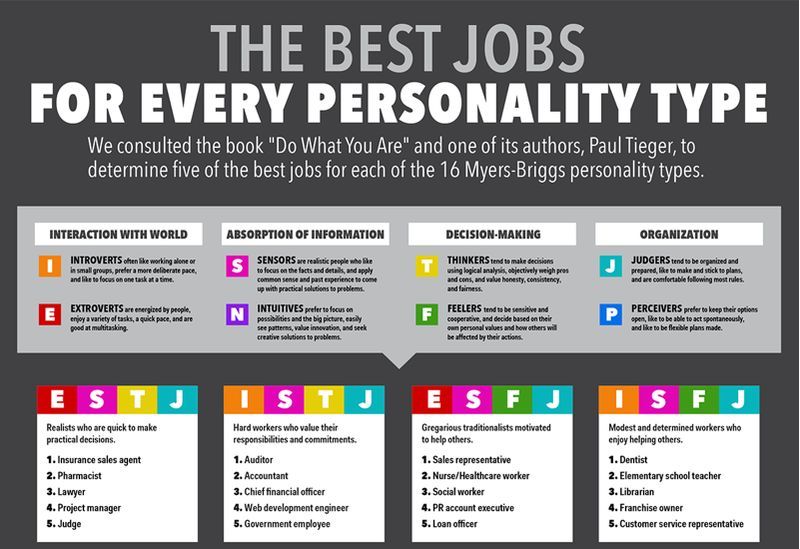
The top 5 most common personality types ranked
There are clear differences between the most common personality types in men and women but there are also patterns in the general population. Here’s the ranking of the top 5 most common personality types from most common to less common.
-
ISFJ
The ISFJ personality type is the most common personality type in the population, representing as much as 14% of the general population. ISFJs are especially common among women but rarer among men, making up approximately 8% of the male population compared to 19% of women.
-
ESFJ
The next most common personality type is the extraverted cousin of ISFJ, the ESFJ personality type. ESFJs make up approximately 12% of the general population and are one of the most common personality types among women, coming in at around 17%. The ESFJ personality type is much rarer among men with only 8% of individuals fitting the characteristics common to this type.
-
ISTJ
Ranking third in the list of most common personality types is ISTJ. The ISTJ personality type can be found in 12% of the general population. This is also the most common personality type among men, accounting for 16% of men. In contrast, the ISTJ personality type represents just 7% of women.
-
ISFP
Joining the ranking for the most common personality type is ISFP with 9% of the general population qualifying as this personality type. Known as ‘The Composer’, the ISFP personality type is shared fairly equally between men and women. This personality type makes up 10% of women and 8% of men and it’s the fourth most common personality type overall.
-
ESTJ
The ESTJ personality type comes in fifth as the most common personality type in the population. There are approximately 9% of ESTJs in the general population.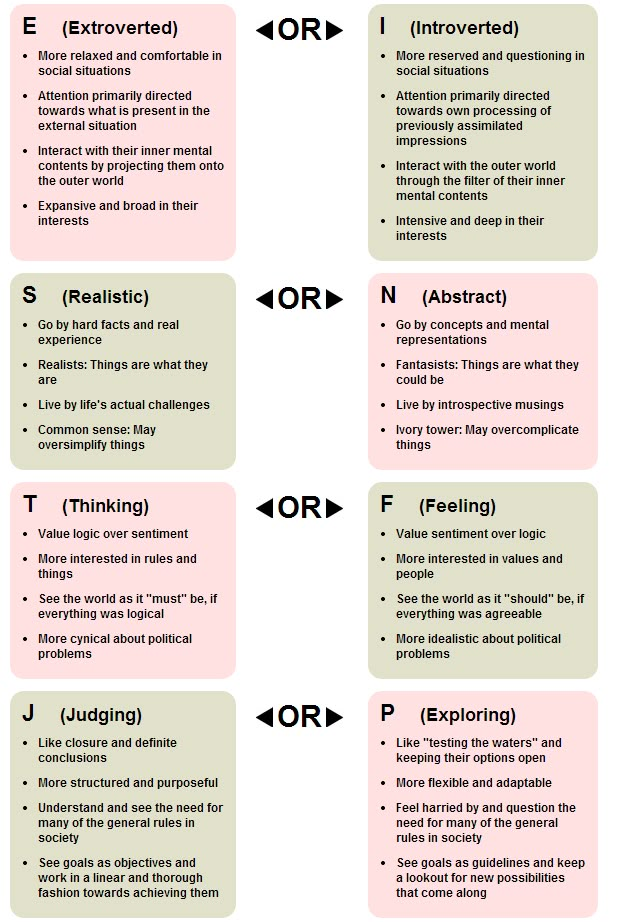 As many as 11% of men qualify as the ESTJ personality type, making it the second most common personality type among this demographic. Among women, this is a rarer personality type with just 6% of women sharing the characteristics of the ESTJ.
As many as 11% of men qualify as the ESTJ personality type, making it the second most common personality type among this demographic. Among women, this is a rarer personality type with just 6% of women sharing the characteristics of the ESTJ.
The link between Sensing and the most common personality types
Have you noticed what the top five personality types have in common? Yes – they are Sensors rather than Intuitives. Sensors account for every single one of the top five most common personality types in the general population and among both men and women.
Sensors process information using their five senses. They prefer to understand the world through what they can see and touch, generally steering clear of abstract concepts and theories. Sensors like to experience things hands-on and they prefer to focus on what is in front of them. This means they’re often described as “practical”.
Do you have the most common personality type?
Of all the 16 personality types, there are a handful of personalities that crop up time and again.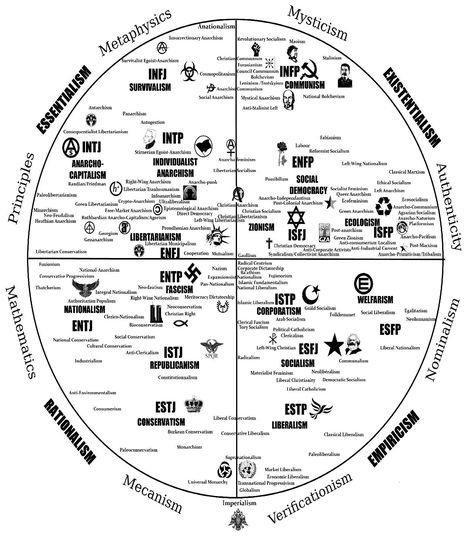 These personality types make up the majority of the population and you probably know quite a few people who fit the characteristics of these most common personality types. If you are one of these types, there’s a fair chance you know someone who thinks like you!
These personality types make up the majority of the population and you probably know quite a few people who fit the characteristics of these most common personality types. If you are one of these types, there’s a fair chance you know someone who thinks like you!
If you’re not sure of your personality type, and you want to know whether you’re one of the more common or rarer types, take the test!
How Rare is Your Personality Type?
Human motivations vary from one psychological type to the other, but how often can these types be found in the general population? Many people are curious about which personality types are more common (or rare) than others – and want to know where their type falls on that scale. Below, you will find the estimated frequencies of each of the personality types (sorted per temperament) by total population and by gender.
Take our Free Personality Test to learn your personality type. This is the ultimate personality profile test, with more than 20 pages of results about you.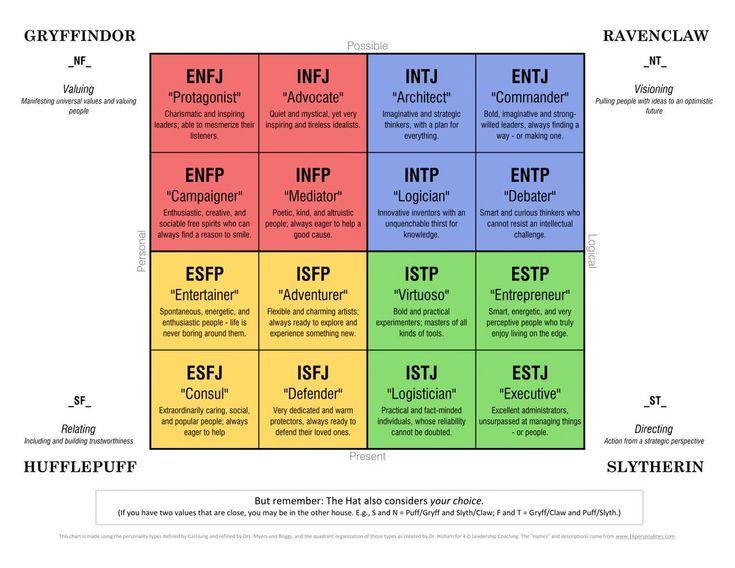
How rare or common are each of the 16 different personality types? Where do you fall on the scale? Does gender change the frequency of personality types? You will find the results that answer these questions on this page.
Page Contents
- The Percentages of the 16 Personalities
- Personality Type Percentages
- SJ Population Statistics
- SP Population Statistics
- NT Population Statistics
- NF Population Statistics
- Personality Type Percentages by Gender
- Rarest Personality Type
- Rarest Male Personality Type
- Rarest Female Personality Type
- Other Rare Personality Types
- Most Common Personality Type
- Personality Type Percentages
It should come as no surprise that the data on how 16 Briggs personality types are distributed is already well established. It is derived from data from the 16 Personalities Foundation themselves and, in the following article, you will see the curated statistics regarding each type in the United States’ population.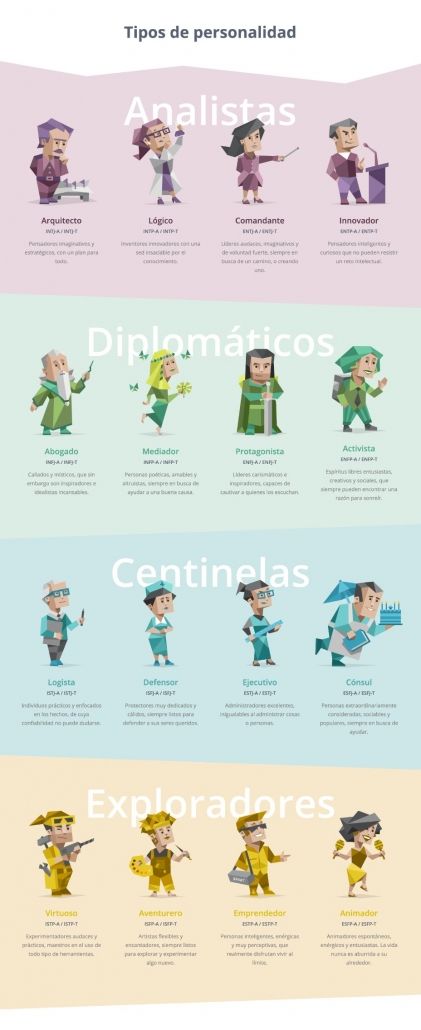 For ease of reading, each batch of four personality types is categorized according to the temperament it belongs under. The discovery that these “batches” share similarities among each other, based on their personality preference, can be attributed to David Keirsey, Ph.D, a renowned clinical psychologist, author and professor at California State University, Fullerton.
For ease of reading, each batch of four personality types is categorized according to the temperament it belongs under. The discovery that these “batches” share similarities among each other, based on their personality preference, can be attributed to David Keirsey, Ph.D, a renowned clinical psychologist, author and professor at California State University, Fullerton.
Before we begin, as a reminder, here are what the personality type letters stand for:
- Extraversion vs. Introversion (E and I)
- Sensing vs. Intuition (S and N)
- Thinking vs. Feeling (T and F)
- Judging vs. Perceiving (J and P)
As you will see below, people who have the Sensing type, the Feeling type and the Judging type are more frequent than those with the Intuition type, the Thinking type and the Perceiving type. Down below you will find the distribution for the rest of the personality traits. Interestingly enough, both the Introvert and Extrovert nature is evenly distributed across the collected data.
In each section, we have also included our own statistics, according to our own data. Our personality type percentages are our own personality type statistics drawn from the 6 million people who have taken our test.
Personality Type Percentages
Before we dive in deep, here’s a brief overview of what the type preference distribution looks like, as well as the frequency of each personality type.
This data is taken from the 16 Personalities Institute:
- Extroverted: 49.3%
- Introverted: 50.7%
- Sensing: 73.3%
- Intuition: 26.7%
- Thinking: 40.2%
- Feeling: 59.8%
- Judging: 54.1%
- Perceiving: 45.9%
This table shows the percentages for different personality types.
| Personality Type | 16 Personalities Percentage |
| INTJ | 2.1% |
| INTP | 3.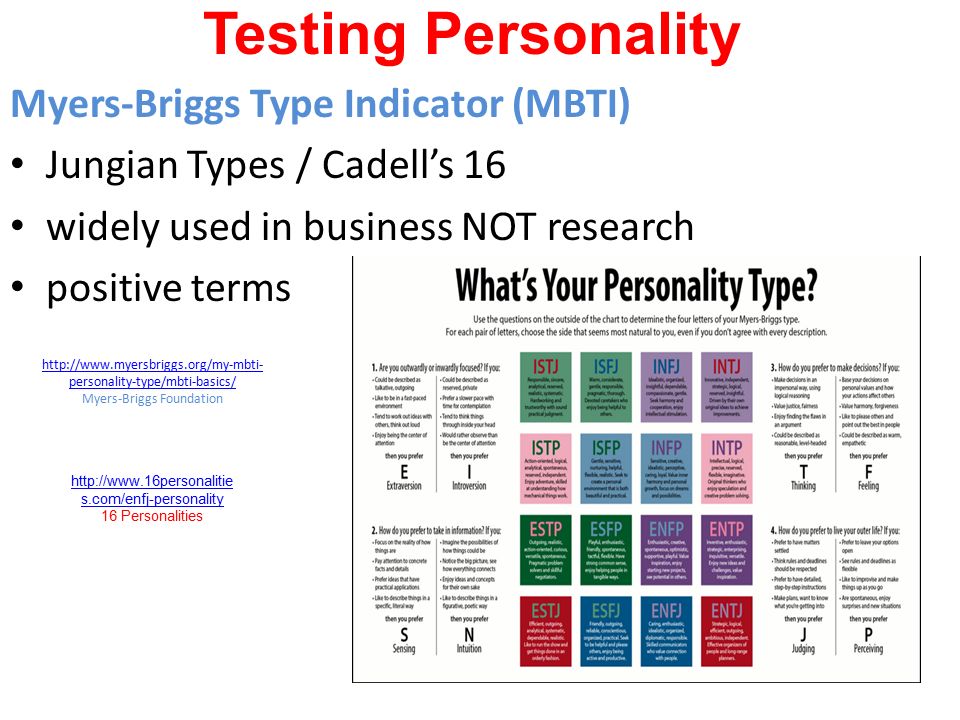 3% 3% |
| ENTJ | 1.8% |
| ENTP | 3.2% |
| INFJ | 1.5% |
| INFP | 4.4% |
| ENFJ | 2.5% |
| ENFP | 8.1% |
| ISTJ | 11.6% |
| ISFJ | 13.8% |
| ESTJ | 8.7% |
| ESFJ | 12% |
| ISTP | 5.4% |
| ISFP | 8.8% |
| ESTP | 4.3% |
| ESFP | 8.5% |
SJ Population Statistics
SJ temperament personality types (also known as Protectors) are observant, stable and motivated to keep their lives and those of their loved ones secure. They are reliable, diligent and disciplined, often making excellent leaders.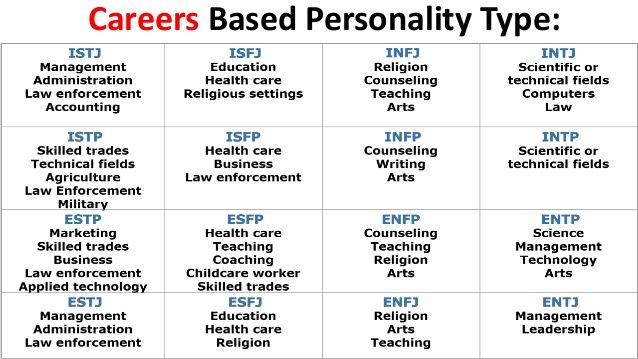
This table shows the personality type percentages for SJ temperaments:
| SJ Temperament Type | 16 Personalities Statistics | pMax Statistics |
| ESTJ | 8.7% | 4.5% |
| ESFJ | 12% | 2.3% |
| ISTJ | 11.6% | 8.6% |
| ISFJ | 13.8% | 2.8% |
TOTAL: 46.1%
SP Population Statistics
SP temperament personality types (also known as Creators) are experimental and primarily driven by sensation. They are very flexible, aesthetically aware and “here and now” type of people.
This table shows the personality type percentages for SP temperaments:
| SP Temperament Type | 16 Personalities Statistics | pMax Statistics |
| ESTP | 4.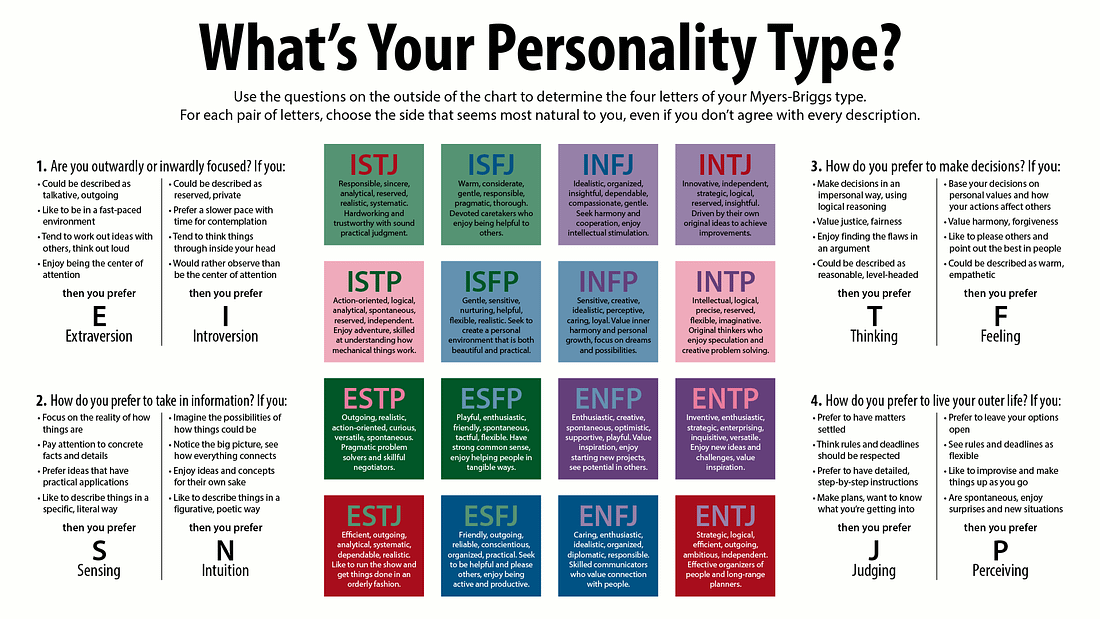 3% 3% | 3.2% |
| ESFP | 8.5% | 2.9% |
| ISTP | 5.4% | 5.1% |
| ISFP | 8.8% | 2.8% |
TOTAL: 27%
NT Population Statistics
NT temperament personality types (also known as Intellectuals) are introspective, logical and on a constant quest for knowledge. They are abstract, theoretical and technically adept.
This table shows the personality type percentages for NT temperaments:
| NT Temperament Type | 16 Personalities Statistics | pMax Statistics |
| ENTJ | 1.8% | 4% |
| ENTP | 3.2% | 6.6% |
| INTJ | 2.1% | 7.8% |
| INTP | 3.3% | 11.9% |
TOTAL: 10.4%
NF Population Statistics
NF temperament personality types (also known as Visionaries) are introspective and intuitive types, who are also highly idealistic. They are compassionate, with a desire to contribute goodness and meaning into the world.
They are compassionate, with a desire to contribute goodness and meaning into the world.
This table shows the personality type percentages for NF temperaments:
| NF Temperament Type | 16 Personalities Statistics | pMax Statistics |
| ENFJ | 2.5% | 2.9% |
| ENFP | 8.1% | 11% |
| INFJ | 1.5% | 4.2% |
| INFP | 4.4% | 19.4% |
TOTAL: 16.5%
Personality Type Percentages by Gender
Of course, there are some personality differences in the distribution of personality types by gender. Some types have more male representation as opposed to female and vice versa. Sadly, the 16 Personalities Institute doesn’t provide information on this, so we had to use our own data to present the findings.
To supplement our data, we have also turned to another well-known and authoritative study on gender differences and stereotypes.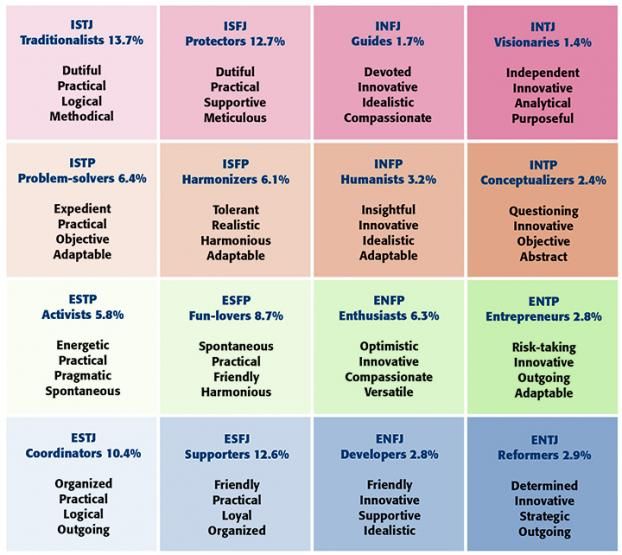 This normative study was conducted in 1996 by Allen Hammer and Wayne Mitchell, and is titled “The Distribution of Personality Types In General Population.” It surveyed 1267 adults on a number of different demographic factors. One of these factors was gender, and its findings can be used to show certain gender trends in temperament preferences in males and females.
This normative study was conducted in 1996 by Allen Hammer and Wayne Mitchell, and is titled “The Distribution of Personality Types In General Population.” It surveyed 1267 adults on a number of different demographic factors. One of these factors was gender, and its findings can be used to show certain gender trends in temperament preferences in males and females.
Below you will find what we (and they) discovered. This table shows the average distributions of the 16 different personality types by gender.
| TOTAL | MALE | FEMALE | |
| INTJ | 2.1% | 3.3% | 0.9% |
| INTP | 3.3% | 4.8% | 1.7% |
| ENTJ | 1.8% | 2.7% | 0.9% |
| ENTP | 3.2% | 4.0% | 2.4% |
| INFJ | 1. 5% 5% | 1.2% | 1.6% |
| INFP | 4.4% | 4.1% | 4.6% |
| ENFJ | 2.5% | 1.6% | 3.3% |
| ENFP | 8.1% | 6.4% | 9.7% |
| ISTJ | 11.6% | 16.4% | 6.9% |
| ISFJ | 13.8% | 8.1% | 19.4% |
| ESTJ | 8.7% | 11.2% | 6.3% |
| ESFJ | 12% | 7.5% | 16.9% |
| ISTP | 5.4% | 8.5% | 2.3% |
| ISFP | 8.8% | 7.6% | 9.9% |
| ESTP | 4.3% | 5.6% | 3.0% |
| ESFP | 8.5% | 6.9% | 10.1% |
Rarest Personality Type
Again, according to the 16 Personalities institute, the INFJ personality type is the world’s rarest personality type.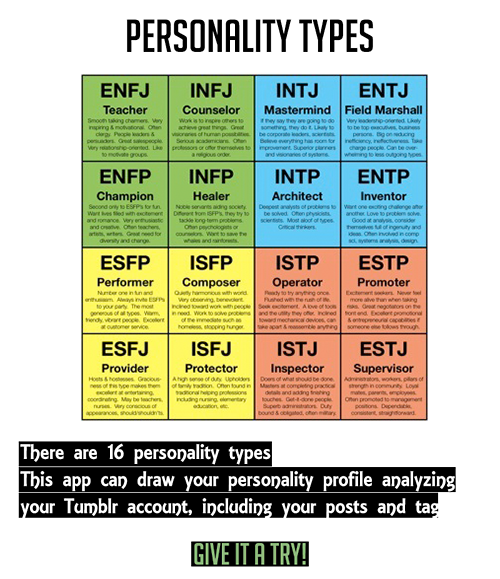 This makes sense as this type has Introverted, Intuitive, Feeling and Judging preferences — which makes them quiet and sheltered people, that are very much in tune with people’s feelings. If a person has this combination of preferences, it’s easy to understand why they would prefer to blend in with their environment, rather than stand out, as they are an introvert. There might be more people that share the INFJ personality traits out there – they just may not like to make themselves known to the world.
This makes sense as this type has Introverted, Intuitive, Feeling and Judging preferences — which makes them quiet and sheltered people, that are very much in tune with people’s feelings. If a person has this combination of preferences, it’s easy to understand why they would prefer to blend in with their environment, rather than stand out, as they are an introvert. There might be more people that share the INFJ personality traits out there – they just may not like to make themselves known to the world.
According to our data, the rarest personality type is ESFJ. A person with this personality type is caring, supportive and is concerned for everyone’s well being and happiness. According to the official 16 personalities data, the ESFJ personality type makes up for 12% of the US population. This difference in statistics may be due to difference in sample size (PMax sampled 6 million people), difference in demographics (PMax has test respondents from different countries, not only from the Unites States) and the fact that people from a certain personality type are more prone to answer surveys, such as the 16 personalities test, compared to others.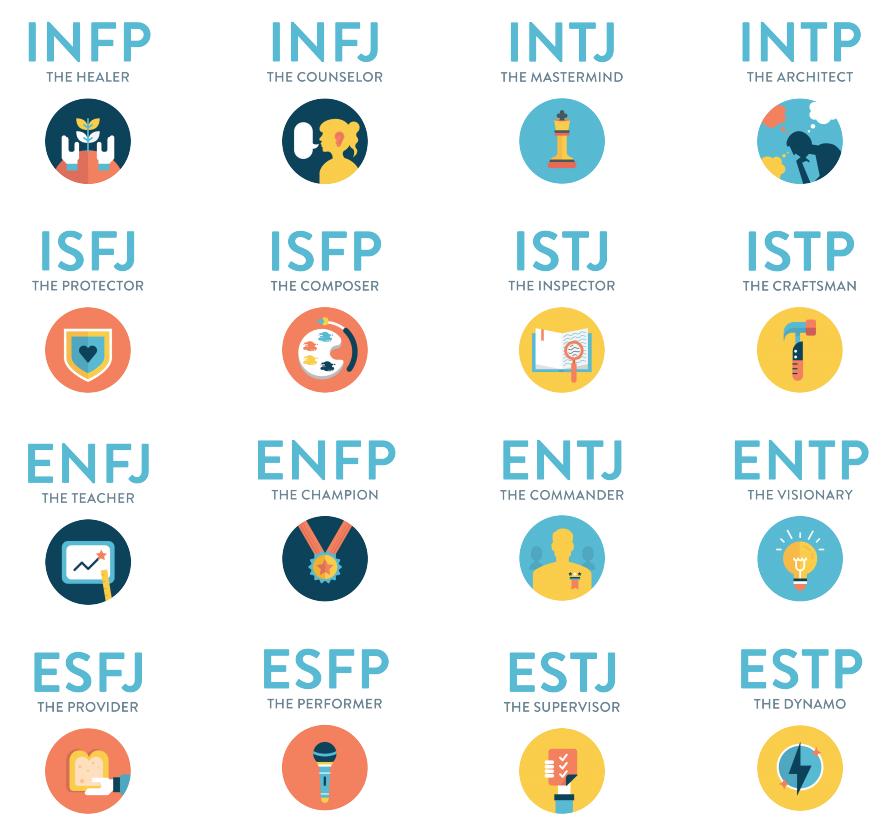
Rarest Male Personality Type
Our data shows that the rarest male personality type is INFJ. INFJ men make up only about 0.5% of the total males tested. They are introverted, feeling, gentle and idealistic, but still capable of making decisions and carrying on with their goals. They aren’t static spectators — their belief that good and love will save the world compels them to act. Their superior understanding of people’s emotions makes them very empathic and easy to connect to.
Male Temperament Preferences
According to the Hammer-Mitchell study, 68.6% of men have Thinking personality preferences compared to 38.8% of women. This can explain why INFJ is the rarest type among men. This does not mean that men don’t show any Feeling nature — it simply means that a man, as a stereotype, is more likely to be a Thinking type. It also means that men use the Thinking trait more when it comes to decision-making processes. Even if they are more prone to relying on this preference, it is important to know in which situations it’s important to tune into their Feeling nature.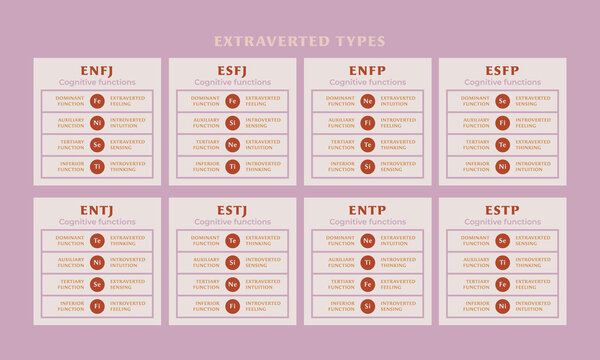 This is a skill worth training.
This is a skill worth training.
Rarest Female Personality Type
Our data shows that the rarest female personality type is INTJ. Female INTJs also make up about 0.5% of the total females tested. These ambitious, introverted and bold people are unbothered by the general opinion of the masses and are not afraid to pursue their own philosophy of life. Their strategic nature compels them to avoid the spotlight and to work from the shadows. This is why they can often be seen alone — but they don’t mind this at all. For them, every move they make in life is carefully considered and planned in advance.
Female Temperament Preferences
Similarly to the above statistic, the Hammer-Mitchell study found that 61.2% of women prefer Feeling compared to 31.4% of men. This can explain why a female INTJ is in fact a rare personality type. Again, this does not mean that women are oblivious to the Thinking personality trait, but rather that they have a different type of personality characteristics.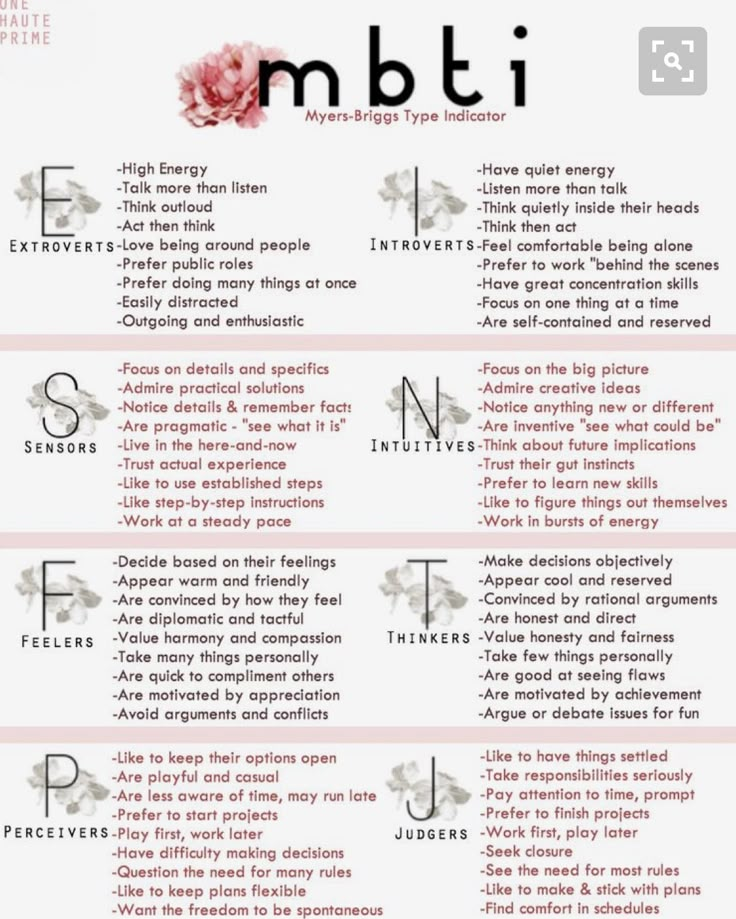 A worthy analogy is that we all have two hands, but we might prefer our right one to do things with, rather than our left one. Or we might throw a ball with our right hand but catch it with our left, and vice versa. Again, when it comes to situations that demand a certain decision to be made, it is important to know which preference should take precedence — be it following your gut feeling or what common sense tells you. This is a skill that can be trained through a number of different techniques — emotional intelligence being one, for example.
A worthy analogy is that we all have two hands, but we might prefer our right one to do things with, rather than our left one. Or we might throw a ball with our right hand but catch it with our left, and vice versa. Again, when it comes to situations that demand a certain decision to be made, it is important to know which preference should take precedence — be it following your gut feeling or what common sense tells you. This is a skill that can be trained through a number of different techniques — emotional intelligence being one, for example.
With INFJ being the rarest personality type, what are some other rare personality types? Here are the top 5 of the rarest personalities according to the 16 Personalities Institute:
- INFJ: 1.5%
- ENTJ: 1.8%
- INTJ: 2.1%
- ENTP: 3.2%
- INTP: 3.3%
Most Common Personality Type
The most common personality type according to the 16 Personalities Institute is ISFJ, the Defender.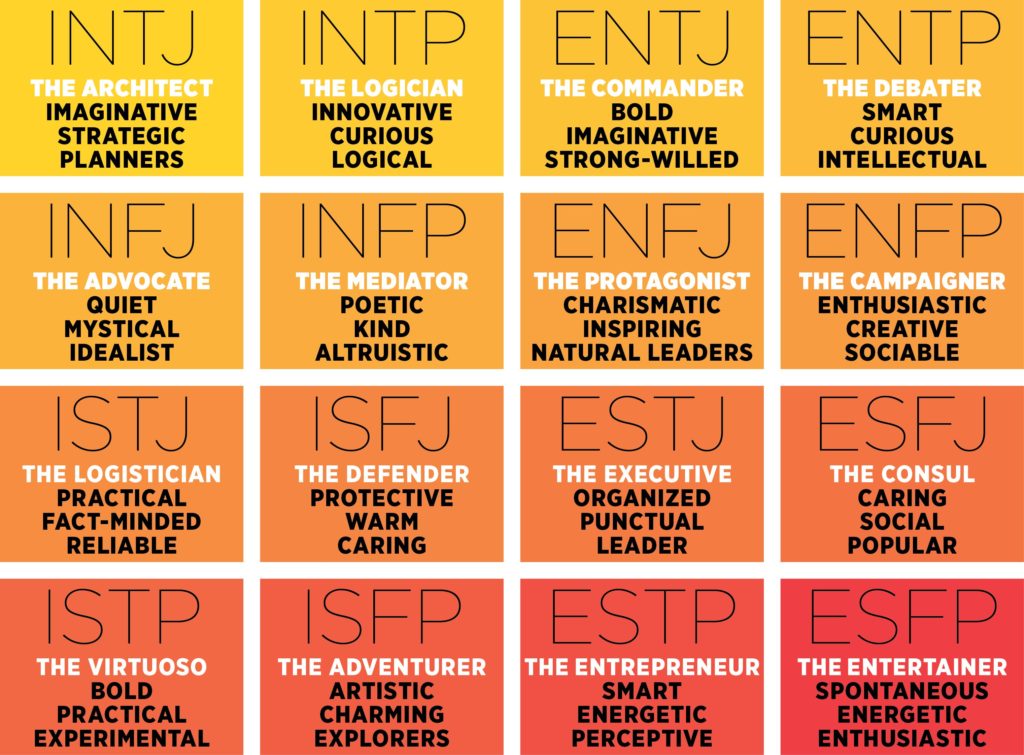 This type makes up 13.8% of the US population. This is also not surprising, as they are very logical and traditional people — there is a very big chance you know someone like that in your surroundings. They can be often found in institutions where procedures are key — administration, for example. This personality type is predominantly female — it has only 29% male representation.
This type makes up 13.8% of the US population. This is also not surprising, as they are very logical and traditional people — there is a very big chance you know someone like that in your surroundings. They can be often found in institutions where procedures are key — administration, for example. This personality type is predominantly female — it has only 29% male representation.
According to our data, the most common personality type is INFP. This perceiving type is shy, quiet, feeling and might seem secluded. However, from the inside these people are empathetic, harmonious and maintain rich inner workings. Perhaps the reason why our statistics found that this is the most common personality type is because INFPs are more prone to want to learn more about themselves, hence are more likely to take personality tests such as ours.
Other Common Personality Types
With ISFJ being the most common personality type, what are some other common personality types? Here are the top 5 most common personality types according to the 16 Personalities Institute:
- ISFJ: 13.
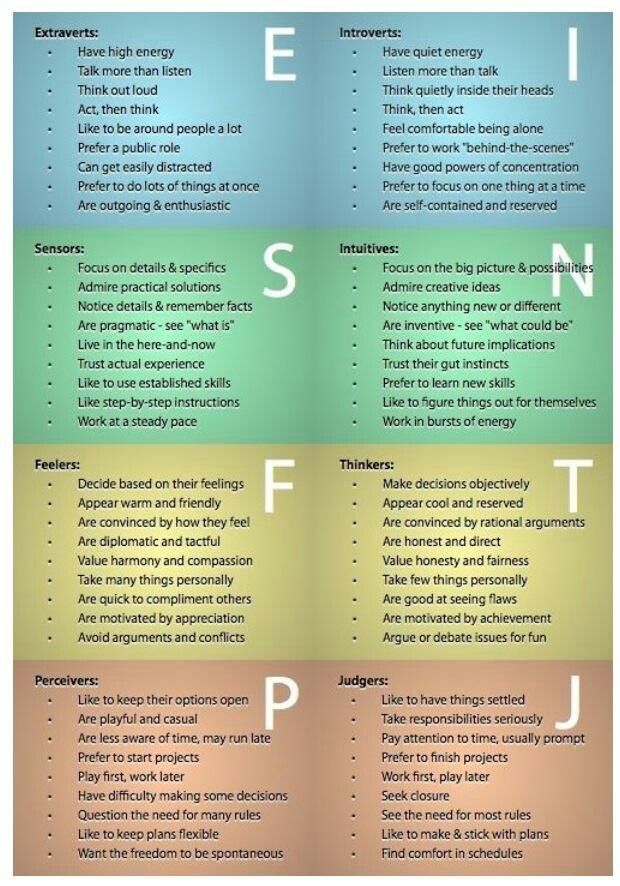 8%
8% - ESFJ: 12.3%
- ISTJ: 11.6%
- ISFP: 8.8%
- ESTJ: 8.7%
What professions are most suitable for different types of personality?
But with others, neither one nor the other works. In order not to lose professionals, but to create excellent working conditions for everyone, many companies are paying more and more attention to various types of psychological testing.
Do you know your personality type?
If not, it's time to find out, especially since it can always be done online. With the help of this test, you will find out what profession you are, regardless of the number of employees in a particular company, with some it is easy and comfortable not only to work, but also to relax. M is the most suitable.
If you are already a business owner, do you know the personality types of your employees? And what type of personality do you have?
Today, interactions in the workplace have changed significantly, as employees are expected to do much more to grow a company than just show up and go about their daily routine.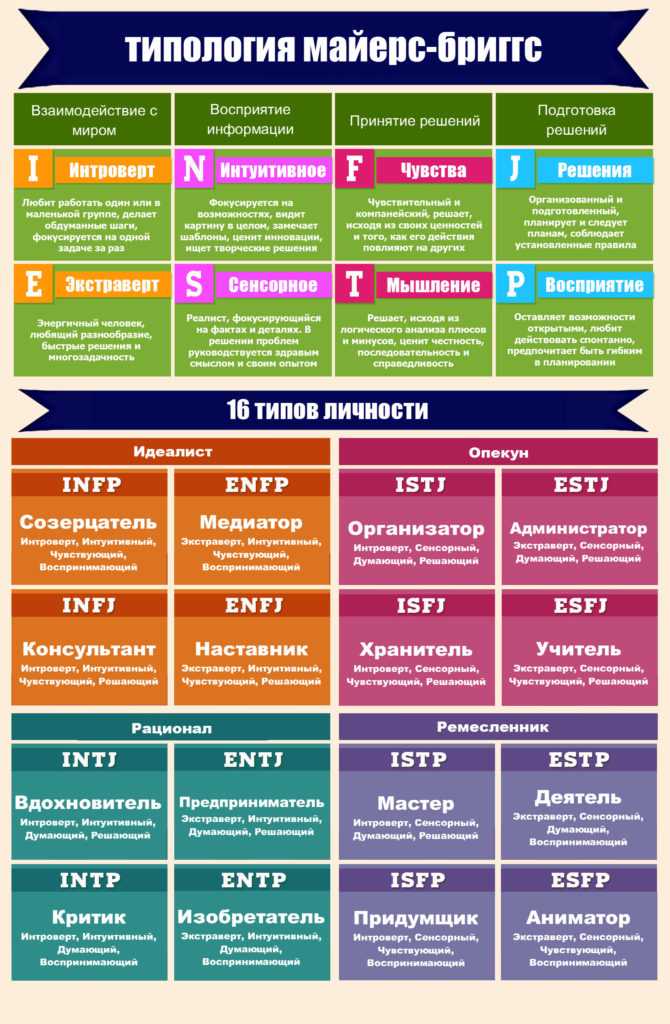 Therefore, more and more companies are using various psychological tests in practice to determine as accurately as possible how comfortable employees will feel in a team and perform daily tasks together.
Therefore, more and more companies are using various psychological tests in practice to determine as accurately as possible how comfortable employees will feel in a team and perform daily tasks together.
Myers-Briggs Typology
Recent psychological studies in this area have shown a significant decrease in motivation, productivity and happiness in many employees of companies of various types. To find out the reasons for this phenomenon, many companies began to actively use various personality tests, such as the Myers-Briggs personality typology. By the way, many large Western companies today prefer this type of psychological testing of their employees.
This typology distinguishes 16 personality types. On their basis, companies can analyze their employees based on the individual characteristics of each. The Myers-Briggs test helps to determine personal preferences in the process of interaction in a work team, based on four pairs:
· extraversion or introversion;
common sense or intuition;
thinking or feeling;
judgment or perception.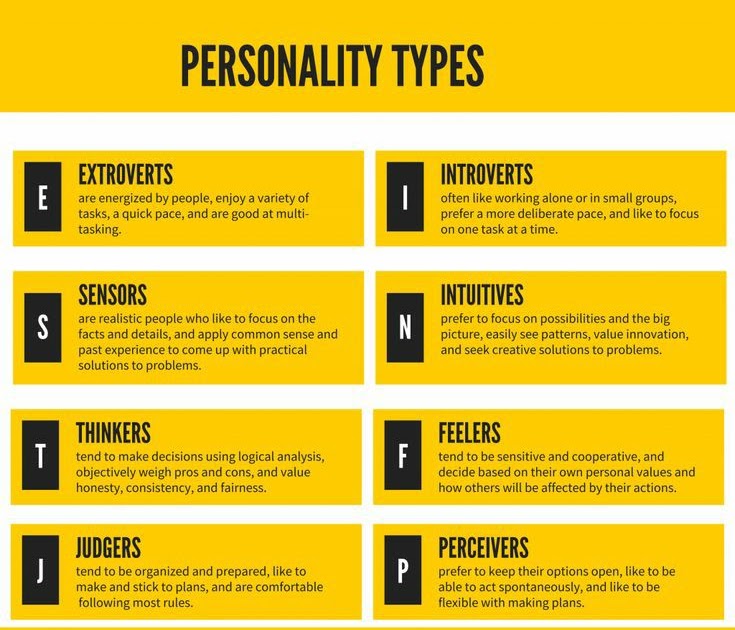
Generally, there are four most common personality types within the workspace of a company. When it comes to getting the most out of the various collaborating teams of employees, it's important to focus on the following. There are several typologies of employee personalities:
ISTJ - Keepers
ISTJ personalities are pragmatists who enjoy a job where they can use logical thinking systems to get the desired result. This personality type focuses on integrity, practical logic, and dedication. Therefore, such employees are an important part of the work of any company. They are the keepers of traditions, as well as guarantors of compliance with labor standards and norms. ISTJ personalities often prefer to work alone, so they can safely be allowed to work from home. If they work in an office, then control over the activities of the team they lead may be minimal. Be sure - the guardians will not let you down.
This personality type includes the following categories:
ESTJ Personality - Manager. Professions: chef, insurance agent, loan officer, administrator.
Professions: chef, insurance agent, loan officer, administrator.
· ISTJ identity - Administrator. Professions: accountant, logistician, office manager.
ESTP identity - Marshal. Professions: investigator, military, foreman, sales manager.
ISTP Personality - Technician. Professions: mechanic, system administrator, engineer, operator.
ISFJ - Defenders
Personalities of this type are reliable, loyal, hardworking, patient, full of enthusiasm. These traits are great for working as a mentor and role model. This type of personality includes introverts. As a rule, they are calm and friendly. At the same time, they have outstanding social skills, which is especially important when working on large group projects. ISFJ personalities take great pleasure in helping colleagues.
This personality type includes the following categories:
Personality ISTG – Logician. He is always guided only by facts.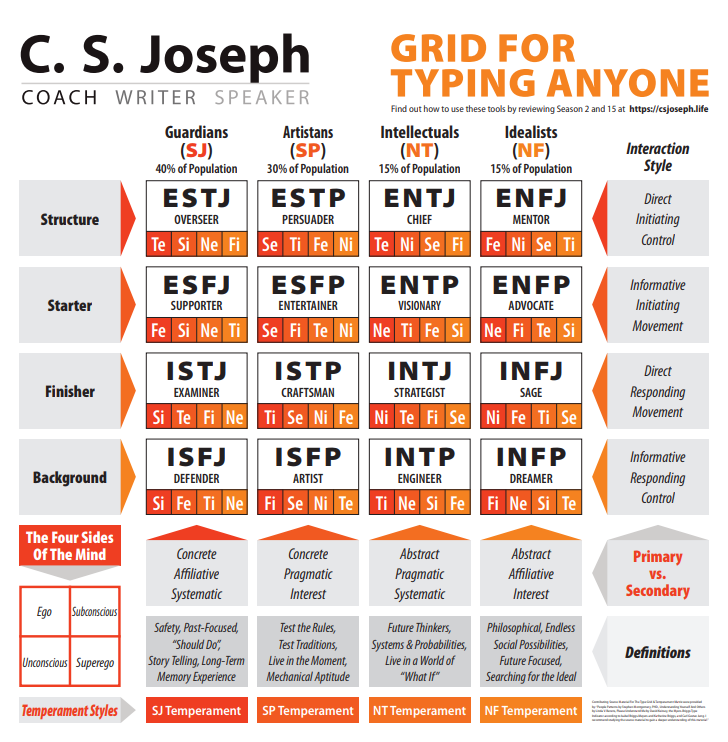 Its reliability is impeccable.
Its reliability is impeccable.
ISFG Identity - Defender. This is one of the most responsible categories of employees who will always help out in difficult times. It is they who, before the deadline, when many give up, take over the project management and achieve the desired results.
Personality ESTJ - Manager. You can trust these people with everything, because they always have everything under control. Under their strict guidance, each process will be checked and “licked” to the ideal.
ESFJ Identity - Guardian. These are the most committed and caring employees who are always ready to help in any matter, regardless of whether it concerns work or personal life.
ISFP – Seekers
ISFPs are true artists who always prefer aesthetics and a sense of beauty in their work. ISFPs take great pleasure in breaking traditional approaches and expectations with their creative experiments. Their standard behavior can be summed up in one phrase: "Don't limit me!"
This is usually a quiet and sensitive personality type.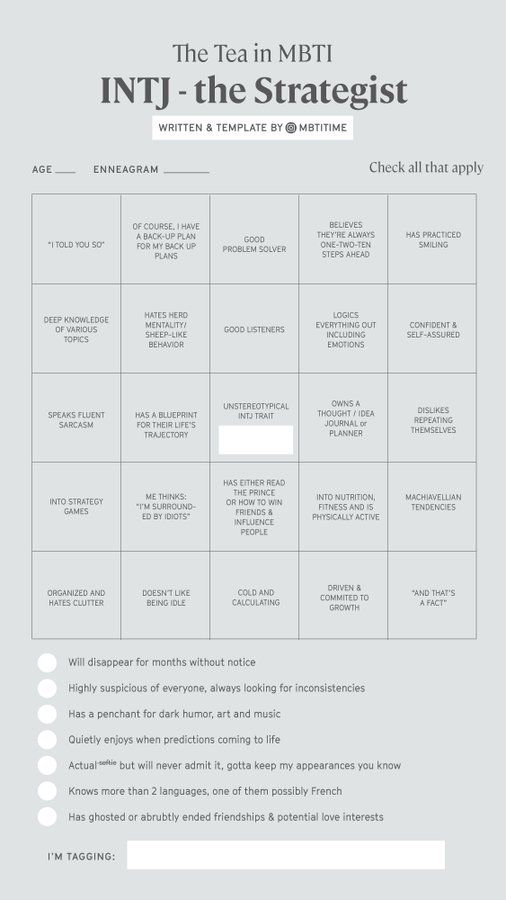 However, they always try to use creative thinking to push the boundaries of social conventions. They always try to break the standard procedure of working on a project, constantly offering unusual solutions to problems. These individuals are unusually strong at generating ideas, which is why they perform best during brainstorming and creative thinking sessions. In the office, ISFP personalities always behave strangely and at ease. However, do not worry about this: this is their usual state, as they are always in a creative search. However, be aware that ISFPs may not be able to complete their tasks within the normal working hours of your company. Therefore, it is always better for them to give freedom of action and allow flexible working hours.
However, they always try to use creative thinking to push the boundaries of social conventions. They always try to break the standard procedure of working on a project, constantly offering unusual solutions to problems. These individuals are unusually strong at generating ideas, which is why they perform best during brainstorming and creative thinking sessions. In the office, ISFP personalities always behave strangely and at ease. However, do not worry about this: this is their usual state, as they are always in a creative search. However, be aware that ISFPs may not be able to complete their tasks within the normal working hours of your company. Therefore, it is always better for them to give freedom of action and allow flexible working hours.
This personality type includes the following categories:
ISTP Personality - Virtuoso. These are real experimenters in everything, whose courage can sometimes only be amazed. They always own different techniques and tools.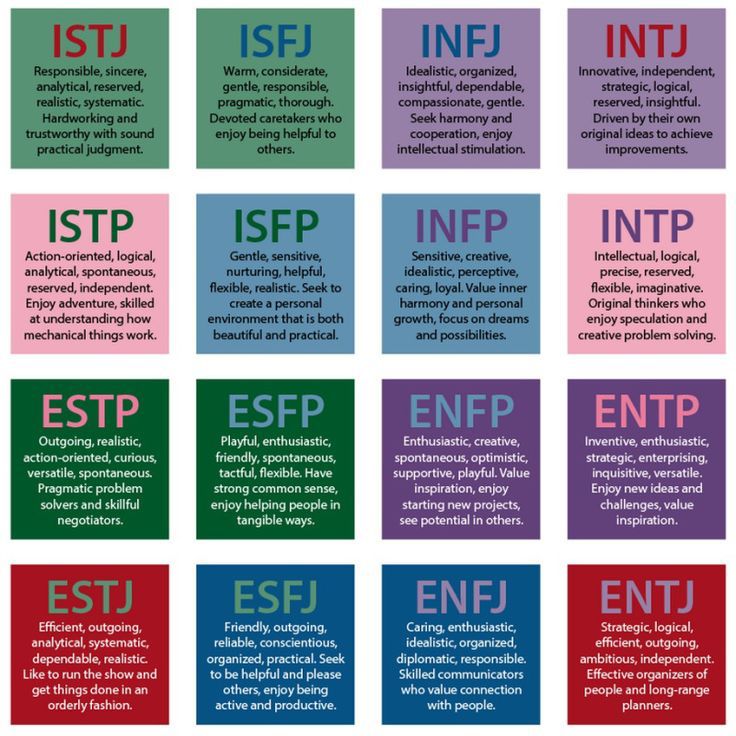
Personality ISFP - Artist. These are creatively flexible people who are always interested in taking on new tasks, since it is at such moments that they generate the maximum number of productive ideas.
· ESTP Personality – Dealer. This type of seekers includes the most energetic and receptive employees, who always take the maximum risks in case of a possible failure of the project. Despite their expressiveness, at 99% of the time they are right.
ESFP Personality - Entertainer. There is never a dull moment with these people. They will always cheer you up, and their spontaneous ideas very often come to the rescue in the most seemingly hopeless situations.
ESFJ - Caretakers
ESFJs are the most common. This is quite logical, given that 12% of the world's population belongs to this type. These are the most socially adapted people who are always interested in what their colleagues, friends or relatives are doing.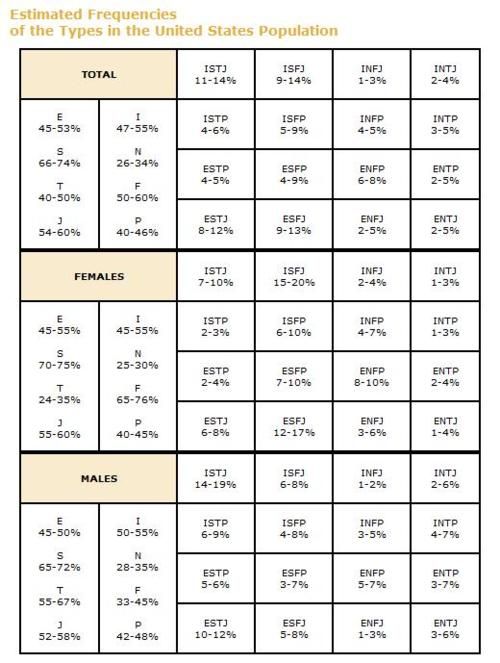 They will always do everything to help their relatives and colleagues. They are sympathetic, sociable and enterprising people. They can achieve the highest results in their work only in a friendly team, where everyone works in a team for a common result.
They will always do everything to help their relatives and colleagues. They are sympathetic, sociable and enterprising people. They can achieve the highest results in their work only in a friendly team, where everyone works in a team for a common result.
This personality type includes the following categories:
ESFJ Personality - Caretaker. Professions: cosmetologist, primary school teacher, nutritionist, director of a children's center.
ISFJ Personality - Curator. Professions: social worker, teacher, librarian, medical worker.
Personality ESFP - Entertainer. Occupations: Bartender, Dental Assistant, Receptionist, Receptionist.
ISFP Personality - Artisan. Professions: jeweler, watchmaker, veterinarian, surveyor.
What else?
Of course, each company may have its own work preferences and approaches to efficiency. However, business owners just need to remember that there are different types of personalities in the team who, being professionals, can overwhelm the whole business, since they have unequal psychological compatibility.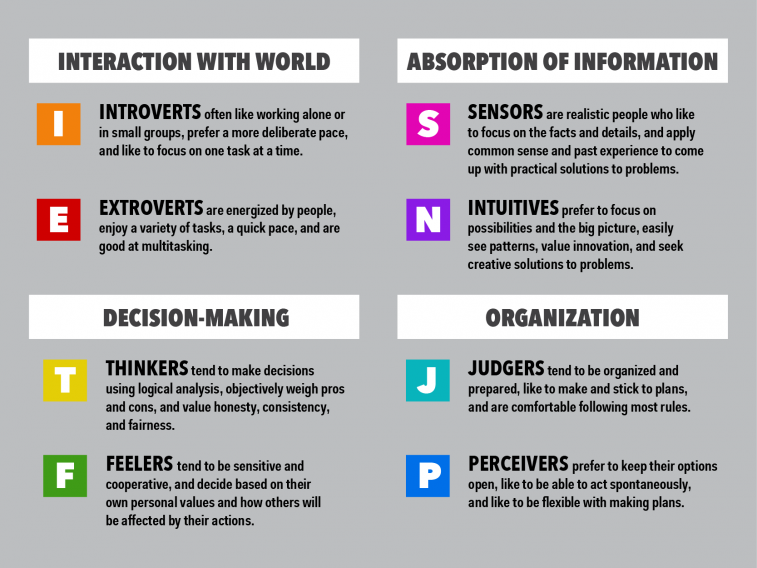 Therefore, one should always remember that with the help of the Myers-Briggs personality typology outlined above, one can always create a friendly atmosphere in any team. In turn, this will certainly affect the success of your business.
Therefore, one should always remember that with the help of the Myers-Briggs personality typology outlined above, one can always create a friendly atmosphere in any team. In turn, this will certainly affect the success of your business.
Source: Tuko News
what it is, functions, decoding and description, how to determine the type of personality according to the Myers-Briggs system
We are different: some people like brainstorming and collective discussions of projects, others do not recognize open spaces and prefer solve all problems alone.
In order to form an effective team from dissimilar people and select the right motivators for each person, it is useful to refer to a system that describes different temperaments and characters. One such system is the Myers-Briggs personality typology.
Elena Fedenkova tells HRD Belkacar what psychological characteristics each of the 16 personality types describes, how to apply this technique in recruiting and properly organize the testing process.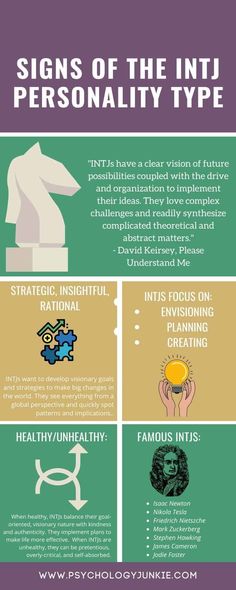
Elena Fedenkova, HRD, Belkacar
What is MBTI typology
The Myers-Briggs personality typology emerged from Jung's typology in the 1940s and became widespread in the United States and Europe. On its basis, a psychological testing system was created - Myers-Briggs Type Indicator (MBTI).
The key idea of this theory is that each person is born with a certain mental structure. This device can be described by four pairs of preferences:
- E/I - extravertive or introverted way of communicating with the outside world;
- S/N - a method of obtaining information based on sensation or intuition;
- T/F - a way of making decisions with the help of thinking or feeling;
- J/P is a way of organizing life based on judgment (rationality) or perception (irrationality).
The meaning of the letters
E/I - extraversion or introversion
The first criterion describes the preferred way of connecting a person with the outside world and receiving stimuli and energy.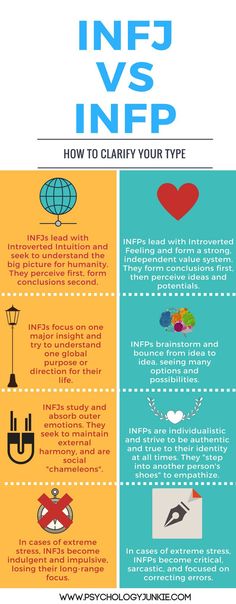 There are two indicators at the poles of this scale: extrovert (E) and introvert (I).
There are two indicators at the poles of this scale: extrovert (E) and introvert (I).
S/N - sensation or intuition
This criterion describes the preferred way of obtaining information - sensory (S) and intuitive (N).
T/F - thinking or feeling
The way of making decisions is described by a pair of "logic (T) - ethics (F)".
J/P - judgment or perception
The last pair of characteristics describes how people prefer to organize their lives. According to this criterion, people can be divided into measured and organized rationals (J) and spontaneous, flexible irrationals (P).
With the help of testing, you can determine which pole on each scale a person gravitates to. Therefore, in the MBTI theory, types are a description of the four most pronounced characteristics of a person.
For example, if the test showed that Ivan is an organized and pedantic (J) extrovert (E) who prefers practical tasks, likes to get tangible results (S) and is able to make informed decisions based on numbers and facts (T), then his type is "Administrator" (ESTJ).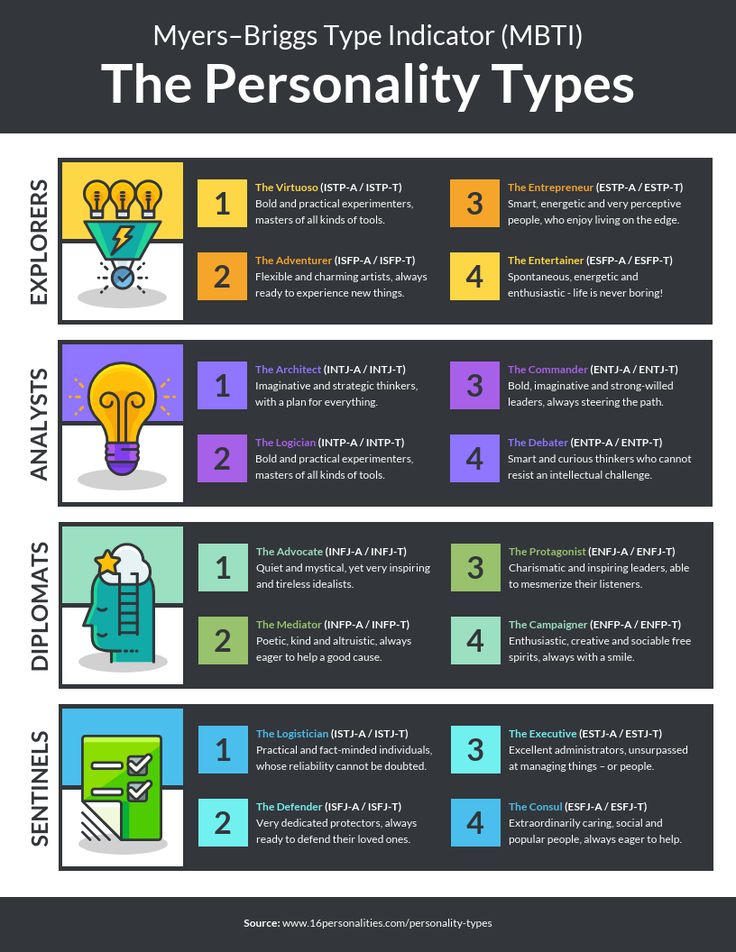
With all possible combinations of characteristics, there are a total of 16 MBTI personality types. But before moving on to them, let's look at the four most effective two-letter temperaments:
- NF (intuitive ethics),
- NT (intuitive logics),
- SJ (sensory rationals),
- SP (sensory irrationals).
Each of these temperaments has strengths and weaknesses.
Personality Types
ISTJ
Pros: is disciplined, consistent and responsible, likes order, keeps his word and keeps his promises.
Cons: prefers one-way vertical communication and orders to requests, is not ready to compromise. Difficulties with intuition and perspective. In personal relationships, the logistician does not always understand the context and does not see the subtext - because of this, conflicts can arise.
INFJ
Pros: is often thoughtful, leads an orderly and planned life, has a developed imagination.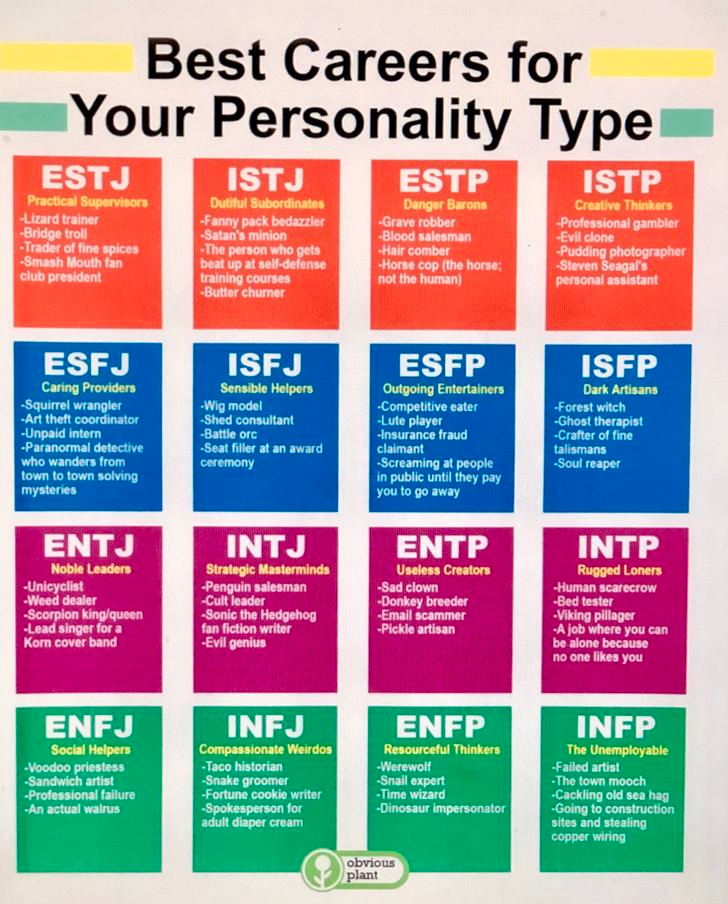 Gentle, caring, sociable and attentive to others.
Gentle, caring, sociable and attentive to others.
Minuses: is prone to self-flagellation, takes any misfortune personally and considers himself the root of all problems.
INTJ
Pros: confidence, stability, competence, insightful mind. Thinks conceptually and strategically, striving for high achievement and excellence.
Minuses: is inclined to attribute his guilt to others - colleagues or partners. He likes to theorize and build speculative constructions, rather than putting ideas into practice and improving processes.
ISFJ
Pros: reserved, quiet, responsible, orderly and attentive to the feelings and experiences of others.
Cons: gets tired quickly due to active involvement in solving problems. From this it becomes scattered, uncollected and demonstrates mood swings. Unable to see the big picture while focusing on the particulars.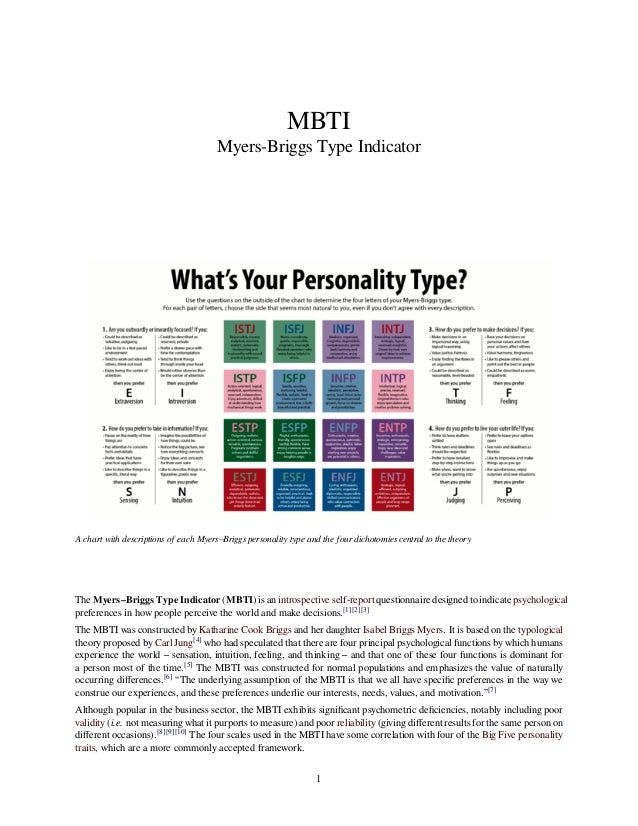
ISTP
Pros: solves problems quickly and practically with calmness and clear thinking. Easily accumulates technical information, the virtuoso is an excellent analyst.
Cons: is bad at routine work and doesn't like to stick to rules. The management style of such managers is harsh, direct and unorthodox.
ISFP
Pros: is a friendly and empathetic altruist. Leads by example, gently and unobtrusively supports his colleagues.
Cons: he is oppressed by the need to see things through to the end and do routine work. Tends to scatter his attention. If there is no element of spontaneity in the work, then he sinks into a depressed state, and his productivity decreases.
INFP
Pros: stores and protects the values of the team, is often its "moral ballast". He knows how to manage employees in such a way that they do not notice at all that they are being controlled.
Weaknesses: has difficulty expressing a point of view that goes against the opinions of others. If the situation at work is heating up, it can fall into anxiety and anxiety.
INTP
Pros: The is a problem solver and drives change and improvement in his or her organization in a relaxed manner. Quickly finds errors and inconsistencies.
Cons: is timid and unsociable. Poorly transforms ideas and theories into real actions and processes. Many brilliant ideas of such a person can be lost, because he rarely shares the fruits of his thoughts with others.
ESTP
Pros: adapts well to change. Masterfully knows how to find solutions for suddenly arising problems. He has precision in his work and deep attention to detail.
Cons: loses concentration in monotonous work and routine tasks. Maybe too careless. Dissolves in particulars, facts and figures, not seeing the full picture behind them.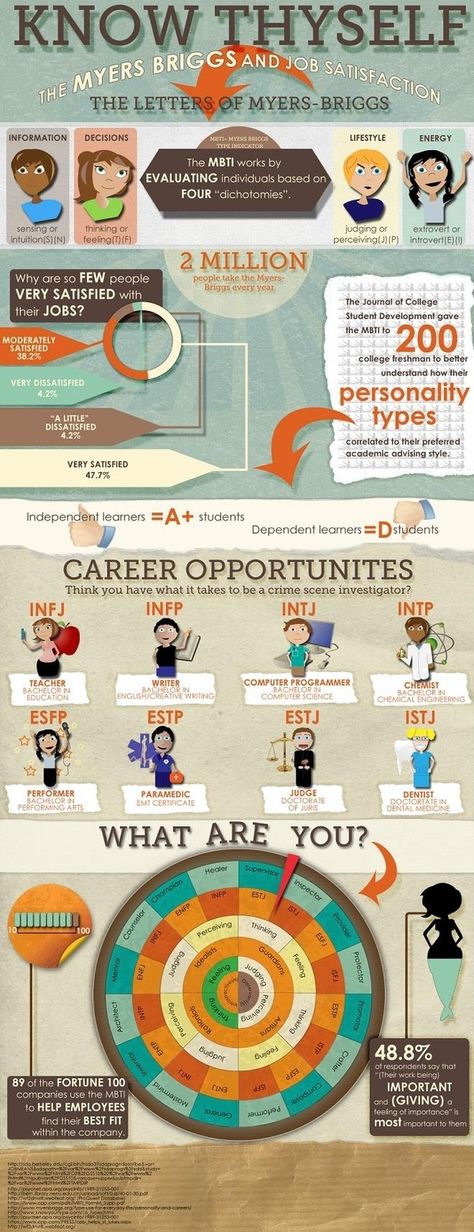
ESFP
Pros: fits easily into any level of team. Able to promote several projects at once. Knows how to put up with the peculiarities of colleagues and allows them to work at a comfortable rhythm and pace.
Cons: often does several things at once, which is why he scatters his energy and can quickly overwork. Does not accept routine work, neglects order and system. Too focused on the present and therefore does not always realize the consequences of his actions.
ENFP
Pros: is insightful, energetic and spontaneous. His enthusiasm motivates and inspires those around him. Encourages freedom and independence.
Cons: often does not keep promises and does not finish what he started. Prone to mood swings. A routine task that cannot be turned into a game or entertainment becomes a source of stress for him.
ENTP
Pros: energetic and optimistic wit.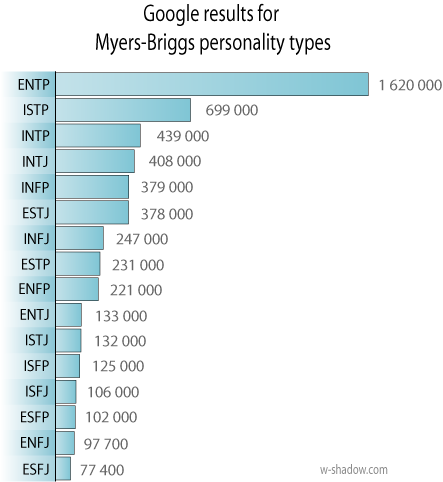 Has a natural curiosity, generates ideas. Relentlessly strives to develop his competence and encourages others to do so.
Has a natural curiosity, generates ideas. Relentlessly strives to develop his competence and encourages others to do so.
Cons: hates routine tasks. Not able to bring their amazing ideas to fruition. Prone to mood swings. He likes to deal with problems with a swoop and does not recognize the gradual solution of problems.
ENTJ
Pros: is a charismatic leader and self-development student. Appreciates productivity and professionalism, motivates others to achieve a common goal. He skillfully copes with difficulties.
Cons: can be arrogant, insensitive, and intolerant. He is not shy when expressing his opinion about others.
ESTJ
Pros: is a leader and workaholic. He solves tactical problems well, appreciates the results more than relationships, follows the rules, does not like chaos and disorder. Responsible and consistent.
Cons: is quite stubborn and not always diplomatic.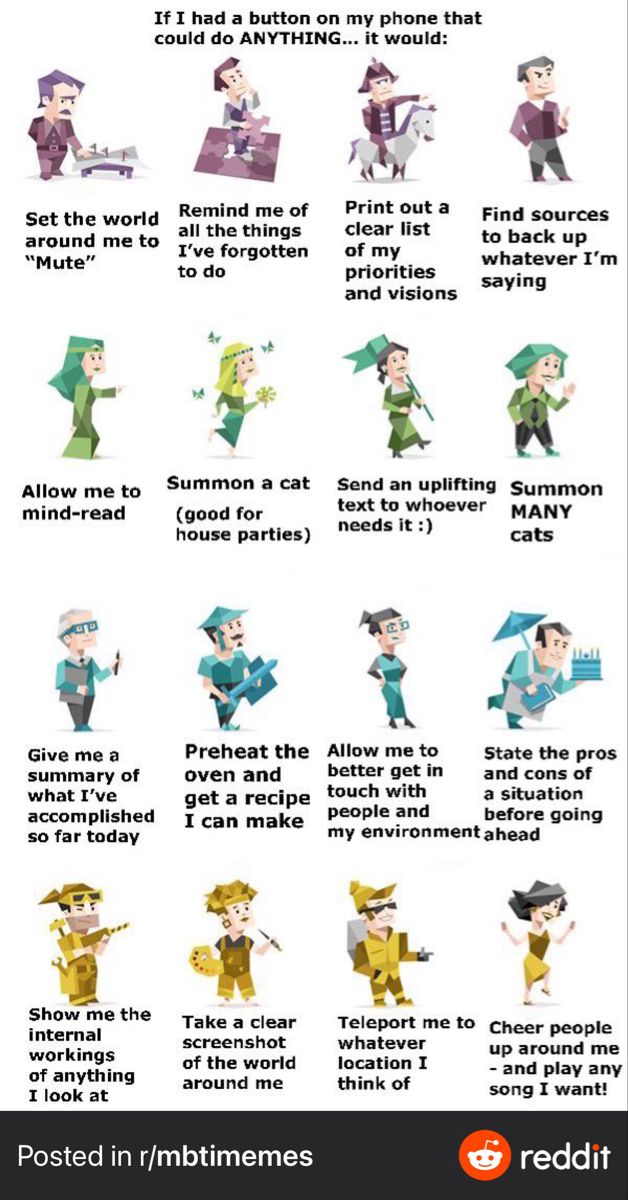 Proving his case, he likes to go to the end. Can flare up in dialogue, loves to cut the truth-womb.
Proving his case, he likes to go to the end. Can flare up in dialogue, loves to cut the truth-womb.
ESFJ
Pros: is an inspiring and generous leader. Creates a harmonious atmosphere in the team, conducive to personal achievements and the fulfillment of tasks. Punctual, tidy and responsible person.
Cons: tends to avoid conflict, preferring to ignore negative changes. More often he concedes than defends his position.
ENFJ
Pros: natural salesman, master of persuasion. Eloquent, energetic. Inspires and motivates colleagues in person.
Cons: often has an obnoxious personality that comes out especially when its values are questioned. For no apparent reason, he may feel guilty and worthless.
Motivation for different groups
In the MBTI theory, personality types have advantages and disadvantages. This can be played to find the right motivator for each person.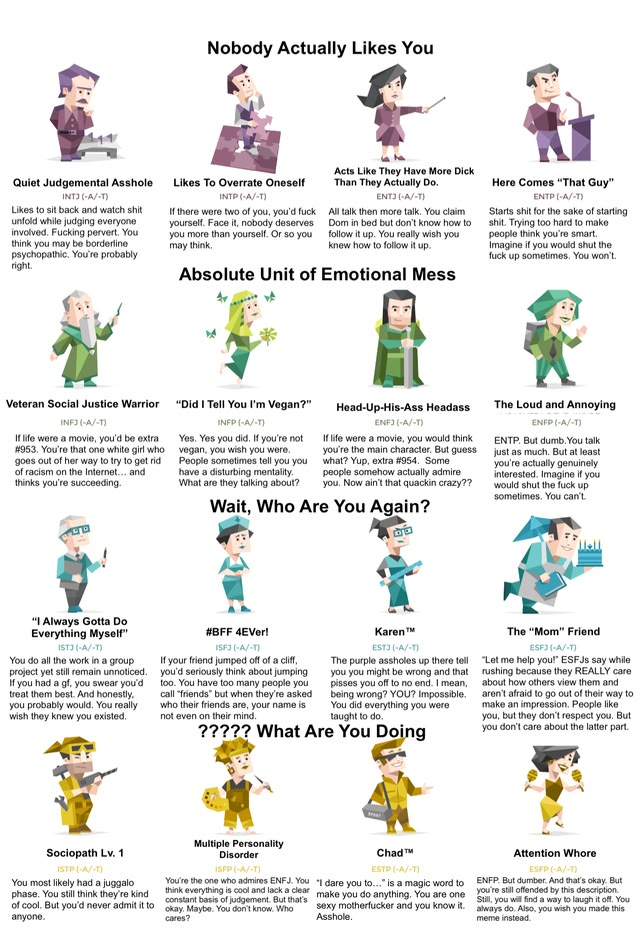
Use a cheat sheet to motivate people with different temperaments:
How to apply
The Myers-Briggs typology is often used to assemble a "dream team": to find people with the right temperament who would do an excellent job and show a good result .
Knowledge of the most common psychological types of people in different positions helps to avoid conflict situations that arise due to differences in thinking.
Let's say that a logistic customer wants to see more candidates: the ones offered by the recruiter are not enough for him. He will not take a word that there are no more suitable specialists. It is better to show analytical and statistical reports - only concrete figures and facts will help to prove to him that there are really few candidates on the market.
How to set up testing
My testing advice goes beyond Myers-Briggs type definition. These are general tips that any recruiter will need:
- Any testing should be done only after getting to know the person personally.
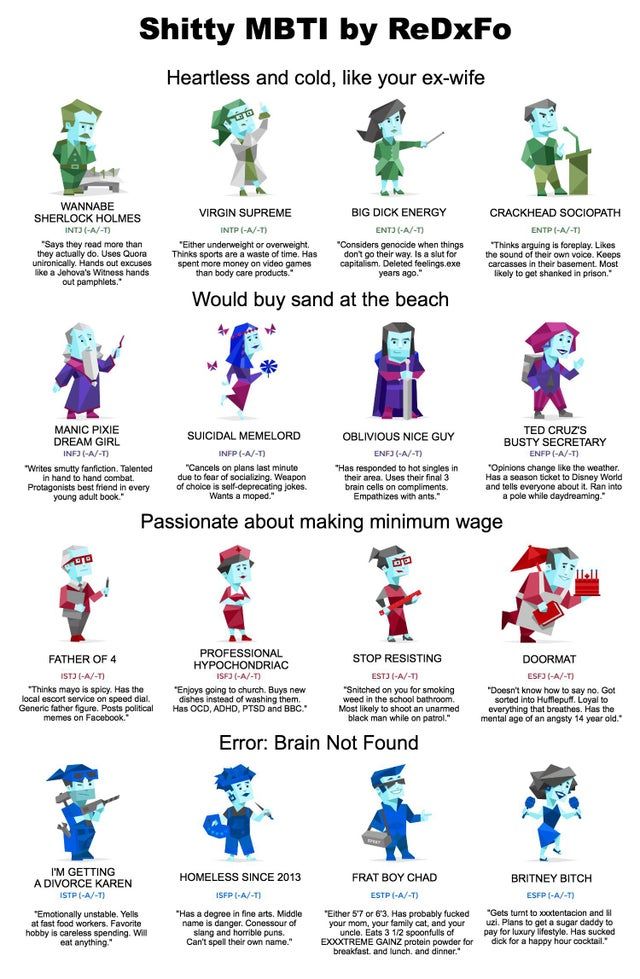 First you need to interest the applicant in the vacancy and understand if your expectations match.
First you need to interest the applicant in the vacancy and understand if your expectations match. - Explain why you are testing. A candidate is more likely to agree to take the test if he understands that in this way you are trying to make your team more effective and find an employee who is suitable for the psychological type.
- Make testing useful to the candidate. Along with the feedback, you can send the test results to the candidate - this way he will learn more about himself and be able to improve his weaknesses.
During a regular interview, which lasts no more than an hour, it is impossible to conduct a full test. Invite the candidate to take the test at home in a relaxed environment, and discuss the results during the interview. There are many testing platforms on the internet. For example, you can use the free online MBTI test on the ProfiTest website.
If the test shows a mixed type, then you can ask additional questions right at the interview to clarify one of the personality criteria.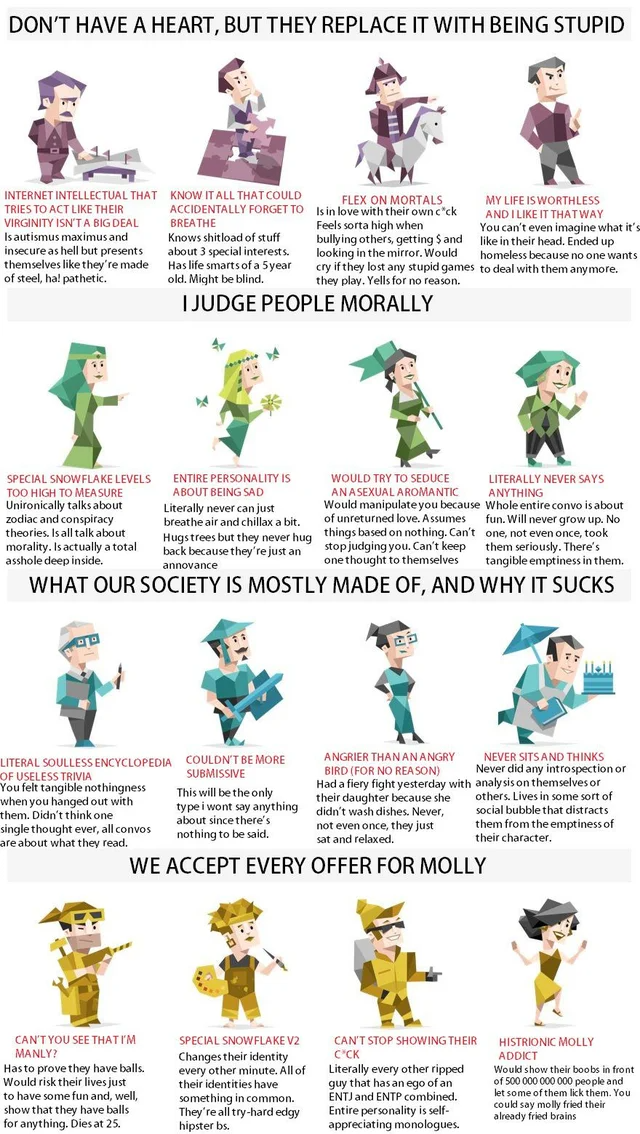 But for this, the recruiter must undergo special training and study the characteristics of each psychological type. A trained recruiter is able to note the characteristics of behavior and the way the interlocutor perceives information in order to determine the psychological type without filling out a questionnaire.
But for this, the recruiter must undergo special training and study the characteristics of each psychological type. A trained recruiter is able to note the characteristics of behavior and the way the interlocutor perceives information in order to determine the psychological type without filling out a questionnaire.
If you don't have time to attend courses, I recommend reading the book Types of People and Business. How the 16 Personality Types Determine Your Success at Work.
What to do if the results are unreliable
The candidate himself can help with specifying the type. Invite the person to read the test results and discuss them together. Sometimes a candidate fully agrees with the description of their type. And in some cases, on the contrary, he can point out discrepancies and explain how he actually acts and thinks in given situations.
Well, if the test results are confirmed by certified MBTI specialists. During the recruitment process, such verification is quite difficult to organize, but you can invite a business coach to test and evaluate people already working for you.
Conclusions
- Myers-Briggs personality typology is based on the assumption that every person is born with a set of certain preferences.
- Innate preferences are described in four categories:
- E/I - extravertive or introverted way of communicating with the outside world;
- S/N - a method of obtaining information based on sensation or intuition;
- T/F - a way of making decisions with the help of thinking or feeling;
- J/P is a way of organizing life based on judgment (rationality) or perception (irrationality).
- Taking into account all combinations, 16 four-letter types are distinguished, as well as 4 most effective two-letter temperaments: irrationals).
- The Myers-Briggs typology is used to create a team whose members match each other in temperament. Knowledge about the characteristics of each psychological type can be used to avoid conflict situations.
- When organizing testing, follow three simple rules:
- any testing should be done only after getting to know the person personally;
- explain to the candidate why you are testing;
- make the test useful to the candidate.
